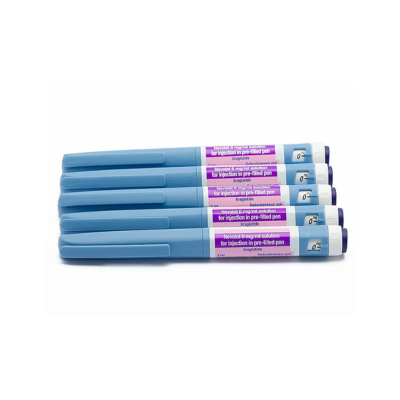Liraglutide (Generic Saxenda)
- Clinically Proven Weight Loss
- Reduces Appetite and Food Cravings
- Easy to Use
- UK Regulated Pharmacy
Liraglutide (Generic Saxenda)
Category:GLP-1 PlansFetching Data...
Frequently Asked Questions for Liraglutide (Generic Saxenda)
What is Liraglutide?
Liraglutide is a prescription weight loss injection containing liraglutide, an active ingredient that suppresses appetite and increases feelings of fullness. It mimics a natural hormone called glucagon-like peptide-1 (GLP-1), which helps regulate hunger signals in the brain. This effect helps individuals consume fewer calories and achieve sustainable weight loss. Liraglutide is licensed for weight management in the UK and is recommended alongside a balanced diet and regular exercise for the best results.
How Does Liraglutide Work?
Liraglutide works by mimicking GLP-1, a hormone released from the gut after eating. This hormone signals the brain to reduce appetite and increase feelings of fullness, helping individuals to eat less and lose weight more effectively.
By regulating hunger, Liraglutide helps to:
- Decrease appetite and cravings.
- Slow digestion, making you feel fuller for longer.
- Encourage healthier portion control and calorie reduction.
Clinical studies show that patients can lose at least 5% of their body weight within 12 weeks when following the recommended dosage schedule.
How to Take Liraglutide
Liraglutide is a self-administered injection that comes in a pre-filled pen. Your doctor will prescribe an increasing dose schedule, which gradually increases the medication to help your body adjust.
How to Inject Liraglutide:
- Prepare the pen by attaching a new needle. Ensure the solution is clear and free from particles.
- Check the flow by performing a dose test before the first injection from a new pen.
- Select the prescribed dose using the dial on the pen.
- Inject the medication into the skin of the stomach, thigh, or upper arm, holding for a few seconds before removing the needle.
- Dispose of the needle safely and store the pen correctly for future use.
Your doctor or pharmacist will provide detailed guidance on how to administer the injection properly.
Side Effects
Like all medications, Liraglutide can cause side effects, but not everyone will experience them.
Common side effects (affecting up to 1 in 10 people):
- Nausea, vomiting, or indigestion.
- Stomach discomfort, bloating, or heartburn.
- Injection site reactions such as redness, irritation, or mild swelling.
- Feeling weak or dizzy.
- Changes in taste.
Less common side effects:
- Dehydration due to vomiting or diarrhoea.
- Gallbladder inflammation or gallstones.
- Increased heart rate.
- General feelings of being unwell.
Rare side effects:
- Kidney problems or acute kidney failure.
- Severe constipation leading to bowel obstruction.
Most side effects reduce as the body adjusts to the medication. If you experience persistent or severe symptoms, seek medical advice.
Warnings and Precautions
Liraglutide is not suitable for everyone, and certain conditions may require alternative treatments.
Do NOT take Liraglutide if you:
- Have severe heart failure or kidney disease.
- Are pregnant, breastfeeding, or planning to conceive.
- Are under 18 or over 75 years old (limited safety data available).
- Have gut or stomach problems, such as gastroparesis or inflammatory bowel disease.
- Are due for surgery requiring anaesthesia.
Drug Interactions
Liraglutide may interact with certain medications, including:
- Blood thinners (e.g., warfarin) – May affect clotting times.
- Diabetes medications (e.g., sulfonylureas like glimepiride) – May increase the risk of low blood sugar (hypoglycaemia).
Always inform your doctor about any medications you are currently taking before starting Liraglutide.
